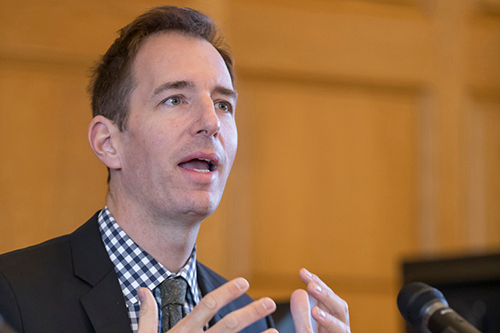This website uses cookies
We use cookies to ensure that we give you the best experience on our website. If you continue to use this site we will assume that you are happy with it.
In December, the U.S. Supreme Court will hear Masterpiece Cakeshop, Ltd. v. Colorado Civil Rights Commission, the latest high-profile face-off between religious freedom and anti-discrimination in the American legal landscape. Some question whether such conflicts can be resolved with legal reasoning at all. Professor Nelson Tebbe has answered those skeptics in Religious Freedom in an Egalitarian Age (Harvard University Press, 2017), celebrated at the Law School on November 17 with a panel of commentators moderated by Steven Shiffrin, Charles Frank Reavis Sr. Professor of Law, Emeritus.

Nelson Tebbe, Professor of Law, Cornell Law School
Speaking first on the panel was Micah Schwartzman, the Joseph W. Dorn Research Professor of Law at University of Virginia School of Law. “In an era of fake news and a post-truth society full of . . . political bullsh** . . . it can be tempting to give in to skepticism and cynicism about reasoning with our fellow citizens,” he observed, “but I think that’s a conclusion we ought to resist, both because it is self-fulfilling and because it leads to a politics that is deeply illiberal, one in which we’re governed, not by reasons that we can understand, but by crass assertions of power.”
He added, “The way to resist critics of reason-giving and of public justification is to give reasons and to offer public justifications for our view, and then to invite others to respond in good faith-and that is exactly what Nelson does in his book, which is an exemplar of moral and legal reasoning.”
Douglas NeJaime, professor of Law at Yale Law School, focused on Tebbe’s chapter about public accommodation, which addresses an anti-discrimination case, similar to that of Masterpiece Cakeshop, in which a same-sex couple was refused wedding-related services by a conservative vendor. NeJaime elaborated on Tebbe’s arguments using social-science concepts of stigma and minority stress. “A prejudiced event may be perpetrated by one person, but it carries a symbolic message of social disapproval,” he said. “These events have a powerful impact precisely because they convey deep, cultural meaning.”
NeJaime cited research indicating that LGBT individuals fare better in regions where social and legal conditions are more hospitable, suggesting that antidiscrimination law plays a role in reducing minority stress, whose far-reaching consequences include impacts on psychological and physical health.
“The hotter our politics become, the more one has to be grateful for a book that models a certain form of community by reason and argument the way this book does,” said Reva Siegel, the Nicholas deB. Katzenbach Professor of Law at Yale Law School.
While praising the book, she questioned whether the method of legal reasoning for which Tebbe argues-what he calls “social coherence”-is limited by a status-quo bias that would “make certain kinds of arguments more audible than others.” She contrasted social coherence with an alternative “social insurgency model” that would amplify voices from both sides of the political spectrum with interests in substantially altering established legal frameworks.
In his response, Tebbe argued that social coherence is not in fact constrained by adherence to the status quo, asserting, “The point of the method is actually to stimulate reexamination of the kinds of inheritances we have.” He added that the claim of his book is, ultimately, quite modest: “It’s just that reasons can be given and that they can do some work, even if, in many or most cases, they’re going to be overwhelmed by power politics and brute economics.” He acknowledged that disagreements will persist no matter what-and that they should be embraced as an element of a vibrant democracy.